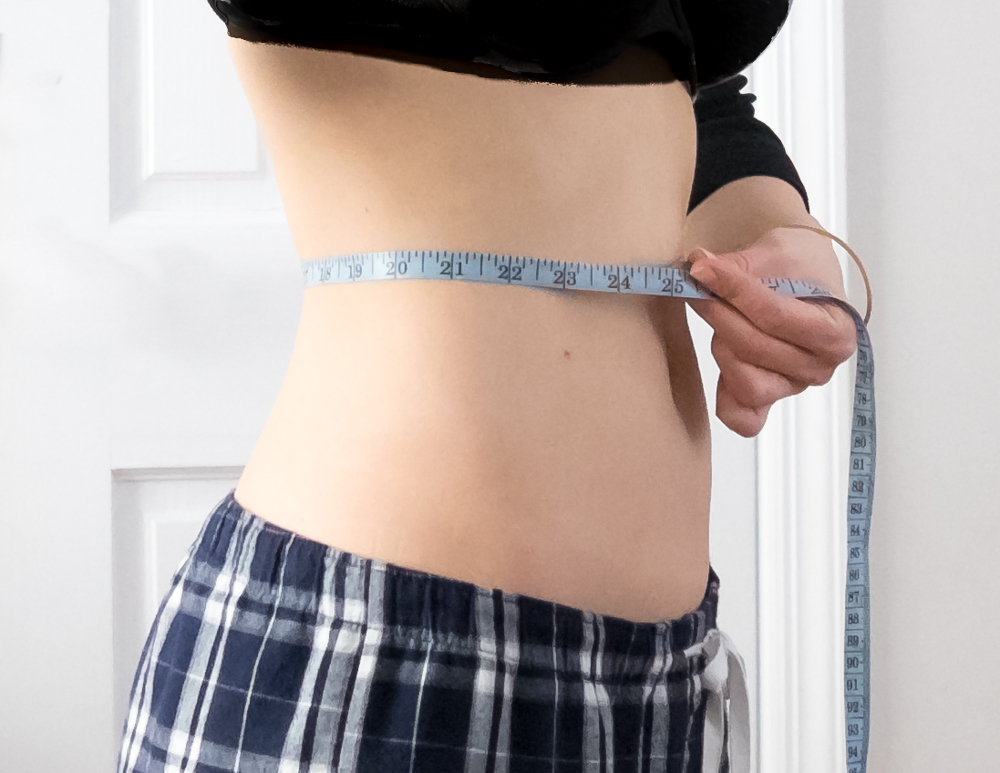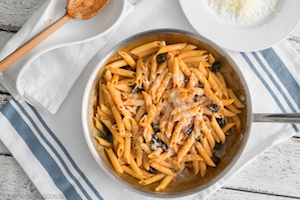After a month with no dairy, I was ready for my next challenge: intermittent fasting. Intermittent Fasting recently hit the internet with a major bang and struck me as nothing more than another fad, based on how many books and documentaries I suddenly found about fasting everywhere, and how many popular new facebook pages and groups have popped up promoting it as a lifestyle.
Then I started to read more about it, and started to see people who followed it have (real, measured, documented in real time) success, and I decided to give it a go… but with less eagerness and dedication than I saw expressed in many others. Fasting is hard and I ♥︎ to eat!

And along the way, I learned a few things…
Breakfast isn’t that important
I hate breakfast. There, I said it. I know that it’s often said that breakfast is the most important meal of the day, but after streaming the entire seven seasons of Mad Men in the last few months I now wonder if breakfast hawking is just the result of great advertising by manufacturers of breakfast foods. I am never hungry when I wake up, and I hated forcing myself to eat because I was told I should. It did NOT make me less hungry the rest of the day, it did NOT give me more energy, and it did NOT help my metabolism or weight loss goals.
Eating breakfast every day caused me to gain weight. I was eating extra calories each day (unwillingly) and I wasn’t exercising more (and I don’t want to) so like thousands of others have discovered, it’s really not that good an idea to force feed yourself breakfast before you start your day if you just don’t want to eat.
(in fact, you should never force yourself to eat when you aren’t hungry)
I did notice that I was getting a lot of health advice from people who weren’t in great shape. Advice like eat breakfast every day, eat 5-6 meals a day, drink lots of water because you should never feel thirsty (why can’t you ever feel thirsty? there is such a thing as over-hydration), and you should have bowel movements at least three times a day— these were all terrible pieces advice given to me and millions of others by well-meaning people who were not particularly fit (including physicians). Sorry, but the proof is in the pudding, so these days I only take advice from people who look great. And a lot of people who look pretty darned great are intermittently fasting.

Eating late at night really isn’t good for you, neither is snacking all day (even if the snacks are healthy), and other misguided tips
Since I discovered in my 20s that my poor eating habits (eating after midnight, lots of coffee, acidic foods, and munching all day) caused acid reflux and a painful ulcer, I tried to eat my last meal earlier in the day. I picked up tips here and there to improve my diet, and some helped, and others didn’t. I learned to sleep on my left side if I recently ate to prevent an acid reflux late at night, I cut out tomato sauce, I started shopping at Trader Joe’s so I could easily shop for all organic foods, and my family now eats about 90% organic.
Of course, the real truth is that eating right before bed isn’t a great idea (even if you are on the OMAD plan and were told to get your one meal a day in as late as possible- gravity is working against you and your poor esophagus), and I really needed to cut out coffee and anything that could cause acid reflux (chocolates and mints too). And snacking? Even if it’s a healthy or some nuts, snacking all day doesn’t really seem to boost metabolism like was surmised. Lean people don’t snack all day. Your body needs a break from producing fat-stimulating insulin and working your organs, so at least don’t eat between meals.
And you can drink too much water. Eight 8 ounce glasses a day was an arbitrary number someone suggested decades ago, and now it’s become sort of dogma without actual proof. So a 250 pound man who works outside and hits the gym daily should drink the same amount of water as a 115 pound woman who works indoors and lives a sedentary lifestyle? Of course not, and many people who are sedentary or only lightly active are drinking too much water. Overhydration can lead to feeling sluggish, electrolyte imbalance, digestive upset, and constipation, so consider experimenting to find out how much really works best for you. Instead of forcing yourself to drink 8 glasses a day, start with one and work your way up as your body adjusts, and see how you feel. Listen to your body and let it tell you what it wants (and not some decades-old approximation for the entire population).
Introduction to Intermittent Fasting
It’s believed that fasting allows your body to heal, your organs to rest, and your digestive system to reset itself if anything is out of whack. There are many ways to fast, and three of the most popular currently are:
1. Fast two days a week from everything but lemon water, and then eat a healthy meal once a day for 5 days. Repeat each week.
2. Fast every other day and eat less than calories on your re-feed days until you reach your goal weight.
3. Fast for 16 – 18 hours of the day and in the remaining six to eight hour window, eat up to 1000 calories only until you reach your goal weight.
I tried the first, and succeeded for a max of 24 hours. I figured I’d take a page out of the handbook of Coldplay’s Chris Martin (he only does it once a week too) and continue with a once a week fast going forward, because I can do that more easily, I will still reach autophagy, and I already fast on Fridays so now I can just incorporate Intermittent Fasting to make Friday a slightly stricter fast. Since that first fast I’ve followed up with several more.
I would like to try again for a 48 hour one day, because autophagy (a process in the body wherein cells clean out old, dead, and damaged parts and recycle them for new, better functioning calls) starts after 18 hours of fasting and at 48 hours that is 30 hours of the body cleaning up and rejuvenating. Then I would eat normally the other five days of the week. For me, normally is only 1200 – 1400 calories because I’m petite and relatively slender now. I can’t eat as many calories as I used to (and I’m not anywhere near as active during the winter months as I am during the warmer months, so I can’t eat more knowing I will burn it off- I won’t). So I eat about 1200 calories a day to maintain.

Benefits of fasting
Here is where it gets crazy… the benefits of fasting are believed to be very vast and broad, covering everything from curing early cancers to preventing Alzheimers. In fact, fasting (particularly dry fasting) has been called the fountain of youth, and even celebrities like Gwyneth Paltrow have indulged. Here are some of the strongly-believed benefits of fasting (and please remember, I’m sharing information I recently learned and am in no way giving medical advice, pretending to be a doctor, or suggesting anyone consider fasting without a doctor’s approval):
♥︎ Improves memory and brain function something I noticed by the fourth day… a lot of energy! And this despite the fact I stopped drinking coffee when I started to fast.
♥︎ Improves digestion because your digestive tract is getting a break, from junk and from working in general, and can start to heal and normalize.
♥︎ Weight loss as your liver empties of glycogen and starts to use your body’s fat stores for energy, you can easily lose quite a bit of weight. If this is something you are interested, there are many sites that guide you through multi-day fasts to help you achieve your goals.
♥︎ Helps you kick bad habits like eating too much sugar or smoking. When you fast, you have to fast from it all, and suddenly everything changes – like your desire for bread or other cravings. You may still want them, but in a more sensible way (and not in a “going home to eat a gallon of cookie dough ice cream” way).
♥︎ Slows and reverses markers of aging when autophagy kicks in and starts to clean up old cells, malfunctioning cells, damaged parts within functioning cells, etc. Because the garbage is being tossed and brand new or rejuvenated cells are taking its place, and that is all over your body- inside and out.
♥︎ Food tastes better and stronger (although sometimes too strong). I love mango, and my first attempt (and second, and third) to eat it after I reset my body with intermittent fasting made me realize it’s not something I’m going to enjoy much anymore, because it tastes waaaay too sweet now. This one was a surprise to me that I discovered on my own- no one told me about this one and I am happy that I will enjoy the real tastes of food now without my taste buds being too numb to fully appreciate the natural yumminess of food.
♥︎ Many other benefits that I’d prefer you research better (so you are better informed) such as the possibility of healing your thyroid, eliminating Type II diabetes, and more… look it up and start learning! If it can help you get off your meds and be healthier than you ever thought, why wouldn’t you want to start researching how Intermittent Fasting can help you?
If you decide to join me and many others in intermittent fasting, make sure to educate yourself on how to stay hydrated during the fast (manage those electrolytes or you can get side effects), and what to eat when you start eating again to not throw your body out of balance again, or gain back all the weight you lost.
Check out other months in the 2018 Get Healthy series:
January- Cutting out dairy products
March- Cutting out sugar



